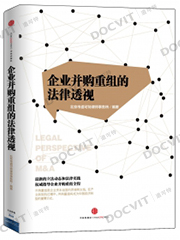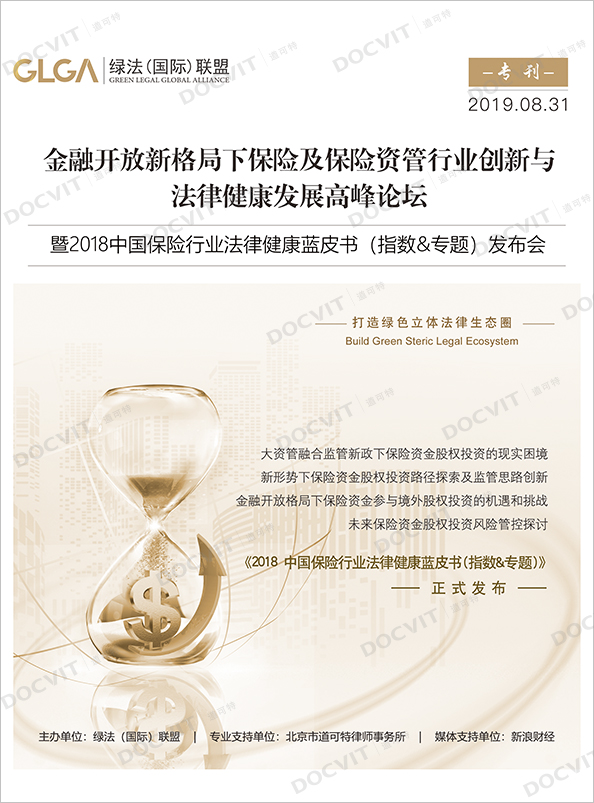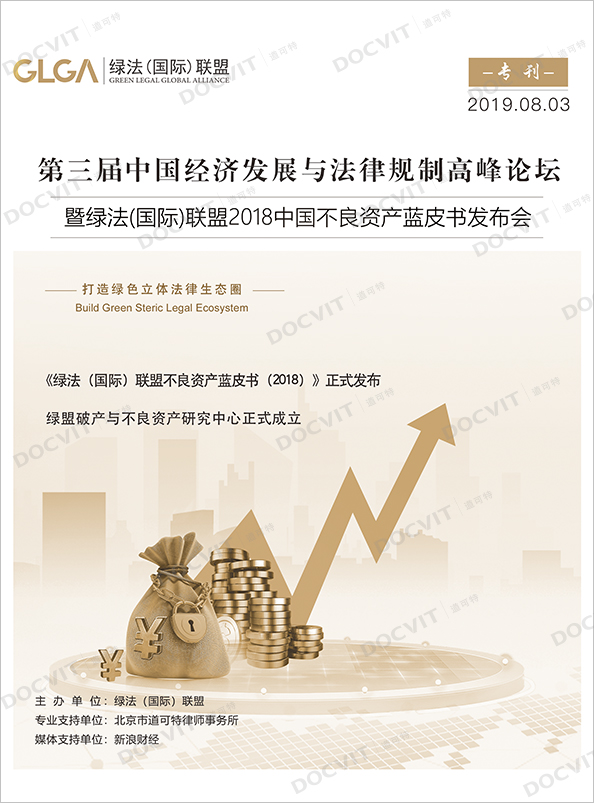Some Misunderstanding Concerning the Corporatization (Corporate System) of Law Firm | Basic Interpretation of the Corporatization (Corporate System) of Law Firm (V)
Source: DOCVIT Law Firm Time: 2016-06-22 14:38:02 Author: LIU Guangchao
After the successive discussions on the issues, such as understanding, the main symbol, development stage and the reasons for selection of the corporatization (corporate system) of law firms, I’d like to exchange some misunderstandings concerning the corporatization (corporate system) of law firms with you this time. This topic is sensitive and practical. Originally, people are exploring the corporatization (corporate system) of law firms and different people have different opinions, and there is still no authoritative conclusion or fixed pattern, so it is far from misunderstanding strictly. However, I always feel that some viewpoints and understandings have already imprisoned our innovation ideologically and even deviated from the essence of affairs. A thing cannot be clarified until we speak it out, so let's just say it and consider it as a discussion. On this issue, Mr. LIU Yaotang once wrote Several Misunderstandings in the Corporatization of Law Firms That Need to Be Clarified and made an in-depth and incisive analysis. I quite agree with his opinion in the article. In this article, I would like to say some more points from another angle.
Misunderstanding 1: The corporatization (corporate system) of law firms is a pseudo-proposition and there is no point in discussing it.
Many people think that law firms provide legal services based on the personal cooperation, so the engagement in capital cooperation should be avoided, let alone doing it like doing business. With such a perspective, the so-called “corporatization of law firms” violates the basic laws of this industry and is a completely pseudo-proposition. If we want to explore and practice the corporatization of law firms, we must face this problem. First of all, it must be clear that the corporatization of law firms only emphasizes law firms’ attribute of corporate governance and management, which is not equivalent to turning law firms into companies that are no different from ordinary enterprises, nor does it necessarily deprive the industry of its characteristics and foundation. So we do not and need not overemphasize corporatization so as to neglect law firms, the main body. Secondly, law firms actually need certain capital cooperation, and the partnership system does not exclude capital cooperation. Companies, especially limited liability companies, pay attention to both capital cooperation and personal cooperation, which does not affect the personal cooperation of the law firm. In addition, it must be stressed that the corporatization of law firms does not actually emphasize capital cooperation but integration and enterprization. Therefore, the corporatization of law firms should not be suppressed under the name of “capital cooperation”. Finally, we must admit that the legal services provided by law firms are also products and need to be operated. Simple knowledge output and single superficial services will definitely be replaced by systematic, professional and team services. "Doing business" is not a derogatory term. It is the bounden duty of law firms to do a good job in the "business" of legal services. However, law firms cannot only do business but also stick to the unique principles and bottom lines of the lawyer industry, which is not contradictory.
Misunderstanding 2: The corporatization (corporate system) of law firms is a scourge that will bring the lawyer industry into commercialization and beyond recognition.
It is a seemingly normal conclusion to emphasize that the corporatization of law firms will lead to commercialization of the industry until it is beyond recognition. Moreover, theoretically, such possibility does exist. However, we may have overlooked two basic facts, namely:
First, there is no large number of corporatization of law firms at present, but there are also signs of commercialization with different purposes. Some blend, some hype, some cross borders, and some manipulate. Second, the corporate world with companies as the main body is full of commercialization, but not all of them are beyond recognition. Even if there are many problems, the root cause is not commercialization, but the lack of pure commercialization, or many behaviors beyond normal commercialization. Therefore, we cannot equate corporatization with commercialization, nor can we equate commercialization with industry beyond recognition. Of course, in order to avoid this possibility brought about by corporatization, we still need to grasp several principles during corporatization of law firm. First, we need to carefully consider and even absolutely prohibit non-lawyer individuals and institutions from investing in law firms; second, we need to clarify the behavioral boundaries of law firms and lawyers themselves in terms of behavior. Third, we need to correctly distinguish between normal operation and abnormal operation of law firms and define the corresponding penalty provisions. In DOCVIT, although we are trying to promote the corporate system, we insist on that non-practicing lawyers are not allowed to become equity partners, and make it clear that law firms and lawyers are not allowed to engage in any non-legal business. We have also formulated the code of conduct for law firms in strict accordance with the Law on Lawyers and relevant regulations. These are all good prevention and responses to this problem.
Misunderstanding 3: When judging whether a law firm is corporatized, only consider whether the distribution of its partners is point-counting system.
Admittedly, the point-counting system has become a synonym for the corporatization of law firms, and judging whether a law firm is corporatized through the distribution mechanism has become a criterion recognized by many colleagues. This may be the biggest misunderstanding of corporatization of law firm in the field of knowledge and practice. The point-counting system is actually only a distribution mechanism and cannot be completely equated with corporatization. The essence of the corporatization of law firms lies in integration, which is symbolized by integration of resources, market, management, team and distribution. The point-counting system solves the distribution integration and also solves the other four integrations to a certain extent, which should definitely be seen as the typical representative of the corporatization of law firms. However, this is not the only choice, and the point-counting system can not absolutely be believed as corporatization. For example, if the law firm does not set up departments, such as brand department, human resources department and research and development department, and there is no real integrated management, even the team is scattered, there will be a second distribution within the team after counting points, so even it is subject to the counting points, it cannot be considered as real corporatization. On the contrary, if a law firm does not fully implement the point-counting system, but actually protects the other four integrations, we must also admit that it conforms to the essence of corporatization. Just as "the market and the plan are both just means to adjust the economy, but not the essential difference between capitalism and socialism", the calculation of points and commissions are also ways for law firms to allocate, which does not necessarily correspond to the corporatization and non-corporatization of law firms. However, we must admit that if a law firm does not have a point-counting system of distribution, but have the commission distribution throughout, it will be hard to imagine that it can really realize the other four integrations, because the absolute commission has made its integration lose its real economic guarantee and interest constraint. Therefore, we can allow some forms of commission distribution in law firms under corporatization, but a point-counting system must be adopted in the main body distribution. Moreover, we should emphasize that how to grasp the proportion of commission and point-counting depends on the firm's partner structure, core culture, development stage, long-term and short-term goals and the degree of integration of personnel and business.
Misunderstanding 4: Egalitarianism can be easily formed during the corporatization (corporate system) of law firms, which will lead to the failure of incentives and restrictions in law firms.
This may be another "evil spirit" of many colleagues who refuse the corporatization of law firms. The corporatization of law firms must emphasize the integration of distribution, and it is difficult to quantify the assessment of lawyers, which forces many firms to choose equity equalization and advanced synchronization after corporatization. In the end, distribution has become "egalitarianism", which does not really reflect the contribution degree and growth rate of partners. This is also the real reason why many law firms under pure commission system lose a large number of partners after corporatization transformation, or why new partners of corporatized law firms from the very beginning of their establishment hesitate and develop slowly. It seems to be an inevitable vicious circle. In fact, there are three issues worth discussing. First, in law firms under corporate system, how to determine the threshold and starting point of partners is very important. Solving this basic problem basically eliminates the "egalitarianism". There are many scientific methods that can be used here, and even many models can be developed. DOCVIT considers both history and potential in determining the threshold of partners, and pays more attention to potential. In determining the starting point (points number of partnership admission), it introduces historical deduction, weighted average, reference target, adjustment coefficient, development simulation and other methods. Second, in law firms under corporate system, the system of partner promotion is the soul. Some adopt strict "LOCKSTEP", which only focuses a coefficient of "number of years of occupation" and the promotion at the same rate on average. This is only one kind of practice. If there is strict admission and scientific grading, coupled with an appropriate delisting mechanism, it can be understandable and can even really promote integration. However, it after all gives up the chance for future adjustment and correction. In practice, DOCVIT has adopted such measures as appropriately enlarging the promotion range, scientifically designing the promotion reference coefficient, setting necessary promotion steps, and optimizing the structure of the appraisal committee, which is generally accepted by new and old partners. Third, in law firms under corporate system, the real reason for the "egalitarianism” is that the design of the distribution system relies too much on one-off distribution and takes the points number of partners as the only distribution coefficient. In order to solve this problem, in this reform of corporate system, DOCVIT has divided the distribution of partners into three levels: income generation distribution, undertaking distribution and profit distribution, and considered the combination of equity proportion distribution, instant contribution distribution and historical points distribution in the profit distribution.
Misunderstanding 5: A corporate law firm will turn most salary-based lawyers into artisans and have a ceiling for development.
The vast majority of law firms under corporatization have public salary teams. Moreover, most of these salary teams who are graded with relatively high professional standards concentrate on handling cases without income-generating tasks and pressure. This is the characteristic of law firms under corporatization and one of their competitive advantages. However, this also brings about another problem. Many lawyers believe that in such a mechanism, these salary-based lawyers will lose their market function and gradually become artisans, and there will be an obvious ceiling for their further development, forcing them eventually to either leave or become "vassals" of the firm partners. As a result, lawyers seem to have no usual promotion channels in law firms under corporate system. If this problem is not solved, it will certainly become another “fatal weakness” for corporatization. Actually it is not the case! In any type of law firm, there are pro-professional and pro-market lawyers. On the contrary, in a law firm under pure commission system, since the team is mostly not public, pro-professional lawyers cannot become partners directly by virtue of their case-handling ability, so there is a real ceiling. However, in law firms under corporate system, due to division of labor and cooperation, there is room for designing the system. For example, in DOCVIT, on one hand, we have designed a system of salary partners and senior consultants after the seven-level salary-based lawyers to meet the transitional needs of professional lawyers; on the other hand, we have also specially set up a system of senior partners undertaking cases to tailor the promotion path to the top for expert lawyers. In DOCVIT, as long as you are professional enough, you can reach the top all the way!
Misunderstanding 6: The corporatization (corporate system) of law firms will fragment lawyers' services to clients and kill their individuality.
Many people believe that the lawyer's service emphasizes continuity and individuality, while the standardization, normalization and routinization of services are emphasized by law firms under corporatization, which will restraint the vitality of the lawyer's service, especially that the excessively fine division of labor and rigid process will fragment lawyers’ services and kill them spiritually. This is actually another misunderstanding and even a fallacy. In the lawyer service market, what we often see is the phenomenon that senior lawyers talk about cases while junior lawyers deal with cases, or a lawyer accepts all kinds of cases, which is the real deviation from the purpose of serving customers. While most of these phenomena occur to the law firm under pure commission system. In such a loose law firm, it is formed by the partners and several assistants as usual, and even if there is cooperation, it is a pickup team, and it is impossible for a partner to form a professional team in many aspects or reserve a sufficient salary-based lawyer team. Therefore, the quality of service can be imagined. The salary-based team in a law firm under corporatization can only provide quality and efficient services with the unified configuration, unified control, and unified management of such firm. Of course, the salary-based lawyers are not mature enough. To ensure the height, depth, and personalization of lawyer services, there must be a corresponding mechanism. In this respect, DOCVIT chooses the executive business partner system and the mandatory cooperation system, that is, for each case or project, regardless of the nature, a professional partner must be identified as the executive partner; in case of a cross-departmental business, the case source partner must choose to cooperate with a partner in the professional department. In this way, we will achieve a scale on the basis of specialization. Partners can do their best in terms of specialization, but in the market, they can develop all partners' businesses in all aspects.
Misunderstanding 7: The corporatization of law firm, especially the corporate system, will complicate the regulation of the lawyer industry.
This issue is more sensitive, but there is no need to avoid it. If the corporate system is allowed in the law firm one day, it will inevitably involve various regulations in the field of the company; it seems that there are many new management departments, such as the industry and commerce, taxation, environmental protection, and labor, which will complicate the supervision of the lawyer industry. In fact, this is a real pseudo-proposition. Firstly, in the absence of legalization of the corporate system today, in addition to the industrial and commercial departments, the law firm has accepted the management of other departments, and there is no such a saying that the corporatization suddenly complicates the supervision; Secondly, even if the law firm implements the corporate system and includes many additional management departments, it will not affect the main management by the competent industry authorities; there will be multi-angle and multi-domain management in any industry; however, the diversification of organizational forms will not change its industry nature and competent authority; Finally, after selection of the corporate system, even if there is a tendency to complicate the law firm supervision, the relevant departments should not be overly anxious if the law firm and the industry itself do not mind it.
It is difficult to answer all the questions and confusions about the lawyer's corporatization (corporatization) even upon interpretation of such misunderstandings.
Think over before and while taking any action! Select and insist!
Relevant Recommendation
Inspiration: A Good Law Firm shall be Able to Run like the Portuguese football team without Cristiano RonaldoHow Big Is the Gap Between the Law Firm under Corporatization (Corporate System) and Traditional Commission Law Firms? | Basic Interpretation of the Corporatization (Corporate System) of Law Firms (VI)Some Misunderstanding Concerning the Corporatization (Corporate System) of Law Firm | Basic Interpretation of the Corporatization (Corporate System) of Law Firm (V)Why do we choose the corporatization (the corporate system)? | Basic Interpretation of the Corporatization (Corporate System) of Law Firm (IV)
May be interested
Professional Interpretation
More-
Preventing corporate governance risks under new Company Law2024-07-03The new Company Law promotes the transformation of corporate governance from shareholder primacy to director primacy. This imposes governance responsibility on entrepreneurs such as directors, supervisors, officers (DSOs) and actual controllers of a company, increasing their risk of performing duties with their personal property at stake. Therefore, reducing the risk of entrepreneurs and their families facing compensation over corporate governance is of great concern. -
How to deal with the failures to fulfill duty of diligence?2021-10-25Both party A and party B are shareholders of company a, with a accounting for 30% of the shares and B for a state-owned enterprise holding company, accounting for 50% of the shares. Mr. Li is a director appointed by company B to company a, and also the head of financial department of company A. At the beginning of 2021, party A learned that there was still 1 million yuan of capital contribution of company B due but not paid in, and Mr. Li never called on company B according to his duty when he clearly learned that company B did not fulfill his obligation of capital contribution. In addition, Li used his authority to change the management authority of company A's office system, adjust the relevant processes and procedures of the company's internal management, and put pressure on the employees without reason, resulting in the failure of company A's normal operation for three consecutive months. In view of Li's behavior, how should company a and shareholders a protect the rights and interests of the company and themselves? -
Voting rights can be restricted if shareholders fail to invest?2021-08-24In recent years, the competition for corporate control has become more and more intense. The form of competition is no longer confined to the background, but gradually moved to the stage. In order to fight for corporate control, the disputes about the representation of corporate will caused by the internal power struggle in commercial cases are increasing. Voting right has also become the focus of contention among shareholders. If they fail to fulfill the obligation of capital contribution on schedule, there are serious differences among shareholders about whether their voting right can be limited. In the absence of special provisions in the articles of association, should shareholders vote according to the proportion of paid in capital contribution or the proportion of subscribed capital contribution?
Business Area
More-
Since its establishment, DOCVIT has taken the corporate governance as its basic business area. With rich experiences, DOCVIT has provided long-term legal services for large and medium-sized state-owned enterprises, private enterprises, foreign invested enterprises, government departments and other clients. Relying on excellent and exquisite professional skills and serious and pragmatic professional accomplishments, DOCVIT’s corporate governance team has provided high quality and efficient legal services for clients and has won the recognition from industry and praise from wide range of clients.
-
As one of the basic business areas of DOCVIT, during the period of more than ten years, the legal service of dispute resolution has developed gradually from the traditional litigation and arbitration into comprehensive, professional and high-quality legal services including commercial dispute resolution, financial litigation and investigation. The dispute resolution team of DOCVIT has rich experiences in full agency of litigation and arbitration cases as well as handling emergencies. It can provide constructive and feasible solutions for complex disputes and minimize the cost of dispute resolution for clients.
-
Various PE, securities issuance and listings, M&As and other financial and capital market legal services are the core businesses of DOCVIT. After more than ten years of efforts, DOCVIT has formed a capital market legal service system containing various PE businesses as the core business together with other legal services for securities issuance and IPO, refinancing of listed companies, M&As and reorganization, equity transactions, new OTC market, asset management and financial derivatives.
-
DOCVIT has extensive experiences in legal services in the fields of infrastructure, real estate, energy and others. Over the years, DOCVIT has been providing legal services for social infrastructure, transportation, communication and information, oil and gas, water and environmental protection, energy and power and other projects, especially has obvious professionl advantages in BOT, BT, PPP and other engineering urban infrastructure financing and has won the outstanding market reputation.
-
Intellectual property has been a key business area for DOCVIT. Along with the rapid development of the information age, DOCVIT has been providing strategic legal advices from the concept to the commercialization and protection of intellectual property to maximize the realization of clients' intellectual property. At the cutting edge of market and legal development, clients can rely on our first-class technology background and integrated services pertaining to intellectual property management, consulting and litigation to solve the most complex challenges.
-
DOCVIT owns a team engaging in and specialized in overseas investment as its main business, and all the members of such team are graduates from domestic or foreign famous law schools, and most of them have working experiences in European and American law firms. They are familiar with cross-border merger and acquisition laws and practices, and they can use fluent Chinese and English to provide all-round, multi-level and professional legal services according to the needs of clients.
-
DOCVIT has outstanding performances in competition and anti-monopoly businesses, and it has provided extensive and profound legal services for domestic and foreign clients. As a key business, DOCVIT has developed a sophisticated service system and top tier service content. With deep theoretical foundation and rich practical experiences, DOCVIT’s competition and anti-monopoly business team provides clients with effective solutions by virtue of its superb professional skills in many large-scale competition and anti-monopoly cases.
-
The tax law business of DOCVIT is in a leading position among Chinese law firms. DOCVIT’s tax lawyers team has professional and systematic knowledge of Chinese and international tax laws in respect of tax arrangement and family wealth management services. In addition, they are proficient in corporate law, banking law, foreign investment law, securities law and laws related to real estate and fund, and they also have international law firm working experiences and are specialized in dealing with all kinds of complex tax matters. They have a wide range of influence and good reputation among industries and clients.
Series Product Line
MoreIndustry Research
More-
Legal Health Index Report on National Insurance Industry (2015 - 2017)Legal Health Index Report on National Insurance Industry (2015 - 2017) is compiled by Green Legal Global Alliance (GLGA), with the Beijing Docvit Law Firm as the professional support unit. Under the guidance of an external team of experts, it is one of the series of research topics in the legal health index report of capital market industry. In 2017, Green Legal Global Alliance (GLGA) successfully released its first research achievement of the series of research projects in the legal health index report on capital market industry, that is the Legal Health Index Report on Private Equity Industry. Report on Insurance Industry Legal Health Index is the second research result of this research topic. -
Legal Health Index Report on National Private Equity IndustryThe purpose of this report is to provide insights into legislation, regulation, and justice in the form of private equity industry indices. As the first legal cross-border alliance which takes the law as the core element, research institute as the support, the Internet as the platform, and the internationalization as the vision, Green Legal Global Alliance (GLGA) has been concerned about the ways in which legislation, regulation and justice will affect the private placement industry. Up to now, the volume of private equity funds has grown to the same level as public funds, and its development speed is so rapid. -
Legal Health Index Report on Listed Companies among Central SOE (A-shares)Legal Health Index Report on Listed Companies among Central SOE (A-shares) is the first index report on the health development of listed companies among central SOE (A-shares) in the market with legal health-oriented and judging criteria. It is the first index report on listed companies among central SOE (A-shares) with public welfare and academic nature launched by a third party, and it is an innovative measure for researching and evaluating the listed companies among central enterprises (A-shares) as a new perspective.
News
MoreNew Year Address From Chief Partner Guangchao Liu | Forge Ahead with Resolve, Chasing Dreams On New JourneyDocvit News | Mr. XI Xiaohong, senior adviser of our firm, was invited to attend "CBLJ Forum 2019" and delivered a wonderful speechDocvit News | Director LIU Guangchao was employed as the instructor of the 11th "Sunshine Growth Program for Young Lawyers" of Beijing Lawyers AssociationDocvit News | A number of management leaders of our firm inspected the progress of a major project and expressed sympathy to the front-line lawyer team
Performance
MoreAchievements of Docvit | We managed to win the bid for the legal service institutional repository of China National Nuclear CorporationAchievements of Docvit | We managed to win the bidding for the alternative repository of legal services intermediary institution of China Petroleum & Chemical Sales Co., Ltd. Shanxi BranchAchievements of Docvit | We managed to enter into contracts with several institutions and would provide regular legal services for them.Achievements of Docvit | We managed to get shortlisted in the external non-litigious lawyer repository of China Chengtong Holdings Group Ltd.
Brand Activity
More-
[08/31]Forum on Insurance & Insurance Asset Management Industries’ Innovation and Legal Health Development under the New Pattern of Financial Opening-up and Release Conference of Blue Book of Legal Health of China’s Insurance Industry 2018 (Index & Special Reports)
At present, China’s financial open-up has entered a substantial promotion stage, and as an important link thereof, opening-up of insurance industry plays a unique role in financial opening-up. Under the new opening-up pattern of finance and insurance industry, and in the new situation of pan-asset management and integrated development, it has become an urgent topic to discuss and study how China’s insurance asset management institutions should grasp development opportunities, meet challenges head on, how to promote standardized transformation and sound development of the insurance and insurance asset management industries, and how to achieve innovation and high-quality development in compliance. -
[08/17]Launch ceremony of DOCVIT bond default dispute resolution new product line and seminar on bond default disposal and bond market development under the new normal of economy
Halfway through 2019, how will the bond market perform in the second half of the year? How will various factors affecting the bond market work? Where are the investment opportunities? How do bond default disposal and bond market develop under the new normal of economy? In order to discuss the above issues in depth, Beijing DOCVIT Law Firm will hold a seminar “bond default disposal and bond market development under the new normal of economy”. At the seminar, DOCVIT bond default dispute resolution new product line will be released; the product line studies and analyzes the development environment of China’s bond market and the problems and challenges facing its dispute resolution in the context of the new normal of economy and, from a legal perspective, explores the new ideas on bond default disposal in the context of tighter regulation. -
[08/03]3rd Forum on China’s Economic Development and Legal Regulation and Release Ceremony of GLGA Blue Book of China’s Non-performing Assets 2018
In recent years, in the face of a complex international environment and arduous tasks of domestic reform, development and stability, China's economy has maintained a generally steady development trend. However, the Sino-US trade issue is still unresolved and, given the aftershocks of domestic market’s breaking the rigid payment, can China’s economy maintain low volatility and high-quality, stable development in the future? And what opportunities and challenges will China’s macroeconomic development face?
-
Limited Partnership in PE of China, an excellent work in the field of private equity
-
Legal Perspective of M&A
-
Foreign PE in China
-
Unscramble PE in China 2nd edition
-
Release Conference of Blue Book of Legal Health of China’s Insurance Industry 2018 (Index & Special Reports)
-
3rd Forum on China’s Economic Development and Legal Regulation and Release Conference of GLGA Blue Book of China’s Non-performing Assets 2018
-
Democracy and Legal System supplementary issue
-
GLGA 1st Forum on Financial & Capital Market Development and Legal Regulation
Three-year Strategy
More-
【Branch Strategy】
Docvit's branch strategy adheres to the corporate collectivized system, emphasizes the separation of the headquarters and Beijing Office, promotes multi-center concept, committing to building a true lawyer development platform for lawyers in the sense of the country and the world. -
【Business Partner Strategy】
Business partners are the core kinetic energy in Docvit's future development. We advocate the team system business for partners and set up the Operation Department, the Business Department or the Division, to form a development cooperation mode focusing on both people and the profession. -
【Future Partner Strategy】
We have developed a comprehensive talent selection strategy, talent development strategy and talent promotion strategy for young lawyers, established five major paths, i.e. setting up special funds, playing roles in front, setting up green ladders, promoting teams led by masters and external learning exchanges, and adopted relevant supporting incentives, etc., to train future partners.
Fellow Program
More-
【Fellow Program I】
With the launch of the "Fellow Program", Docvit hopes to unite with the like-minded lawyers of the country to build a career platform and realize their career dreams together. "Fellow Program I" aims to recruit partners, business partners and executive directors for the Docvit Branch in China. -
【Fellow Program II】
"Fellow Program II" aims to recruit partners and lawyers for Docvit Headquarters and Beijing Office across the country and around the world to become what the industry, Docvit itself, market and clients want. -
【Fellow Program III】
"Fellow Program III" aims to recruit partners for national branches of Docvit nationwide and globally. Docvit's national and global development blueprints require more partners to draw together, and let us work together to create a respectable law firm.

